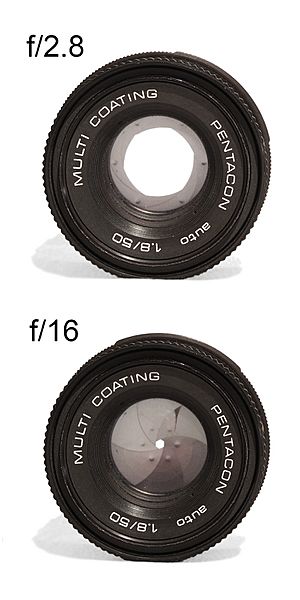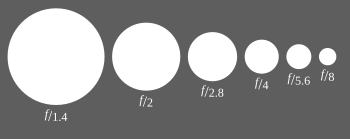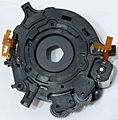Aperture facts for kids
In optics and photography, an aperture is like a small window or hole. It's where light can pass through. Think of it as the pupil of your eye. It gets bigger or smaller to let in more or less light.
Contents
What is an Aperture?
Aperture in Photography
In a camera, the aperture is a special opening inside the lens. It can change its size. This opening is controlled by something called an aperture ring. This ring is usually found behind the lens but in front of the camera's shutter.
The aperture ring has a flat, circular shape. In its center is the small hole, which is the aperture itself. Photographers can make this hole bigger or smaller. If the aperture is very small, only a little light can enter the camera. If it's big, a lot of light rushes in.
This control lets the photographer decide how much light reaches the camera's film or image sensor. The aperture works together with the shutter speed. Shutter speed is how long the camera's shutter stays open. Together, they control the total amount of light, which is called the exposure.
For example, if you use a very fast shutter speed, the shutter opens and closes quickly. This means not much light gets in. So, a photographer might use a larger aperture to let in more light. This helps the picture not look too dark. If the shutter speed is slow, the shutter stays open longer. Then, a smaller aperture is needed. This stops the picture from looking too bright.
Understanding F-stops
The size of the aperture is described using a number called an "f-stop." This number shows how big the hole is compared to the lens's focal length.
- A low f-stop number, like f/1.4 or f/2.8, means the aperture is wide open. It lets in a lot of light.
- A high f-stop number, like f/8 or f/11, means the aperture is small. It does not let in as much light.
Images for kids
-
Alvin Clark polishes the big Yerkes Observatory Great Refractor objective lens, with 40 inches 102 cm across, in 1896.
See also
 In Spanish: Apertura para niños
In Spanish: Apertura para niños
 | Charles R. Drew |
 | Benjamin Banneker |
 | Jane C. Wright |
 | Roger Arliner Young |







